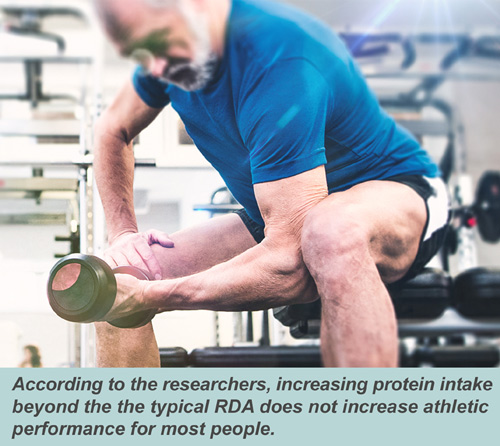Protein is one of the three essential macro-nutrients. Adequate intake is necessary for strong bones, muscle, organs, and pretty much every other part of the body. Protein is also responsible for numerous biological reactions in the body. In fact, it is present in every single cell.
But that doesn’t mean more is always better.
A meta-analysis published in the Journal of Cachexia, Sarcopenia and Muscle in February 2022 found there is no benefit to consuming more protein than the recommended daily allowance (RDA) provided by most governments.
According to the researchers, “Increased consumption had no significant improvement on athletic performance—it only led to minimal muscle gain in healthy adults who were involved with resistance exercise training.”
The research was conducted by an expert group of the European branch of the International Life Sciences Institute. Contributing researchers hailed from a number of countries, including the UK, Spain, France, Italy and Canada.”
What are the RDA’s?
For a rough estimation of protein intake, the National Academy of Medicine recommends consuming between 10 and 35 percent of your daily calories from protein. For most people this would be equivalent to 50 grams to 175 grams per day.
Calculating an exact “personalized” RDA will vary slightly based on which country you live in since each government sets its own recommendations.
In the U.S., the Food and Drug Administration’s protein RDA is 0.8 grams per kilogram of body weight.
This may seem low—and indeed, most Americans exceed this amount without even trying. However, in the UK the government recommends an even lower amount of protein: 0.75 grams per kilogram of body weight per day.
Obviously these recommendations are general guidelines. Proper protein intake will vary by age and other factors. One of these factors is whether or not you’re participating in resistance exercise.
Protein stats are different for the elderly
“Contrary to all the hype that everyone needs more protein, most Americans get twice as much as they need.” This according to an article posted on MayoClinic.org.
So, why do some studies say many Americans are deficient in protein intake?
The answer is aging.
People lose up to 8% of their muscle mass each decade after the age of 50, and it is essential to increase protein intake to slow this process down. Unfortunately most elderly people unwittingly start eating less protein at the very time they should be increasing it.
When assuming a 25% protein increase is necessary, studies show approximately 30% of elderly Americans do not get enough protein.
If a 50% protein increase is assumed, then the majority of elderly Americans do not get enough protein.
Even if you’re a hardcore athlete, though, you shouldn’t just load up on unlimited protein.
A study published in Sports Medicine-Open established there is a dose-response between protein intake and muscle strength.
The researchers documented how there is a “peak” amount of protein that is beneficial, then the benefit quickly tapers off.
For more details on that study, see our earlier post here.
Study details
The primary goal of the researchers was to assess whether extra protein ingestion could increase athletic performance and skeletal muscle mass when the protein was not accompanied by resistance exercise.
Four databases were searched to conduct the meta-analysis. Researchers applied search strategies for protein intake alone or in addition to resistance exercise interventions.
This resulted in a total of 23,757 records making up 164 studies. Finally, 74 random control trials were obtained at the end of the screening process.
The participants’ mean age ranged from 19 to 85 years, and study protocols lasted from 6 to 108 weeks. Daily total protein ingestion of the participants varied from 1 to 4.4 g/kg/day in the intervention groups, and from 0.8 to 2.3 g/kg/day in the placebo/control groups.
Unfortunately for anyone looking for an easy fix, the researchers found none of the studies they examined presented any evidence that extra protein alone improved skeletal muscle mass. Moreover, when it came to athletic performance, the researchers noted, “Effects on bench press strength, handgrip strength, and improved performance in physical tests in healthy adults were trivial or non-existent.”
“Adequate” protein still vital
Notwithstanding the findings, the researchers noted their undertaking was to look at extra protein intake—greater than the RDA—and that their research was separate from the long proven fact that adequate protein is still vital.
“It appears that ingesting sufficient protein is required to maintain muscle mass,” the researchers wrote in the study introduction.
Finally, while protein alone did not present any consistent improvements, the researchers noted that their research did corroborate existing studies that some additional protein is beneficial when accompanied with resistance exercise.
“Findings of the present meta-analysis were that additional protein ingestion together with resistance exercise leads to small additional lean body mass and lower body strength,” the researchers wrote. “This effect seems to be more prominent in younger subjects,” the researchers wrote.
– – –
Protein-providing products from Optimal Health Systems include:
• Optimal Complete Nutrition Plus
• Optimal Collagen Plus
• Optimal Complete Performance-Vanilla
• Optimal Complete Performance-Chocolate
– – –
Sources: Journal of Cachexia, Sarcopenia and Muscle, Sports Medicine-Open.


